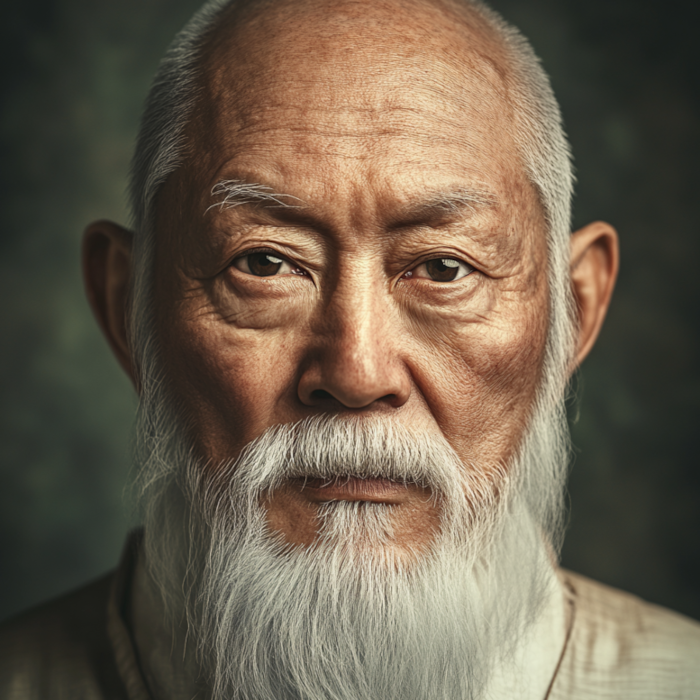


Lao Tzu (also spelled Laozi or Lao-Tze) is a legendary figure in Chinese philosophy and the reputed author of the Tao Te Ching, a foundational text of Taoism. He is considered one of the most influential philosophers in Chinese history and is often associated with the concept of "Tao" (or "Dao"), which can be translated as "the Way" or "the Path." Lao Tzu's teachings emphasize living in harmony with the Tao, embracing simplicity, humility, and compassion, and understanding the natural flow of the universe.
Birth and Life: Lao Tzu's historical existence is debated among scholars, and much of his life story is shrouded in legend. Traditional accounts suggest that he lived during the 6th century BCE, around the same time as Confucius, though some sources place him in the 4th century BCE. According to legend, Lao Tzu was born in the state of Chu in ancient China. His name, Lao Tzu, literally means "Old Master," suggesting wisdom and venerability.
Role and Departure: Lao Tzu is said to have worked as a keeper of the archives in the royal court of the Zhou dynasty. Disillusioned with the corruption and moral decline he witnessed, Lao Tzu decided to leave society and live in solitude. As he was departing, a guard at the western gate asked him to write down his teachings, resulting in the creation of the Tao Te Ching.
Departure into the Wilderness: After completing the text, Lao Tzu is believed to have journeyed into the wilderness on the back of a water buffalo, where he disappeared, leaving no further trace. This act of leaving society to seek a life of contemplation and harmony with nature is emblematic of the Taoist ideal.
Text: The Tao Te Ching (also known as Daodejing) is a short text composed of 81 chapters, written in poetic form. It is one of the most translated works in world literature and is central to Taoist philosophy. The title can be translated as "The Book of the Way and Its Virtue" or "The Classic of the Way and Virtue."
Key Themes:
Influence on Chinese Thought: The Tao Te Ching has had a profound influence on Chinese culture and philosophy. It is foundational to Taoism, a major school of thought in China, and has also influenced Confucianism, Buddhism, and other spiritual traditions.
Taoism: Lao Tzu is regarded as the founder of Taoism, one of the three great philosophical and religious traditions of China, alongside Confucianism and Buddhism. Taoism emphasizes living in harmony with the Tao, the natural order of the universe, and has contributed significantly to Chinese spiritual practices, including meditation, martial arts, and traditional Chinese medicine.
Philosophical Impact: Lao Tzu's ideas have transcended cultural and temporal boundaries. His teachings on simplicity, humility, and harmony with nature have resonated with people across the world and continue to inspire philosophical and spiritual discourse.
Cultural Symbol: In Chinese culture, Lao Tzu is often depicted as a wise old man with a long beard, holding a scroll or riding an ox, symbolizing wisdom, patience, and a deep connection with nature. His figure is venerated in Taoist temples, where he is honored as a deity and a symbol of enlightenment.
Global Influence: The Tao Te Ching has been translated into numerous languages and continues to be studied and revered worldwide. Its influence extends beyond Taoism, affecting a wide range of disciplines, including literature, art, psychology, ecology, and leadership studies.
Comparisons with Other Philosophers: Lao Tzu is often compared with other great spiritual leaders and philosophers, such as Confucius, Buddha, and Jesus. His teachings share common themes with these figures, such as compassion, humility, and the pursuit of inner peace, though his approach is distinct in its emphasis on naturalness and non-action.
Lao Tzu's life and teachings, encapsulated in the Tao Te Ching, continue to be a source of profound wisdom and guidance for people seeking to understand the deeper principles of life and the universe. His emphasis on living in harmony with the Tao, practicing non-action, and embracing simplicity and humility has left a lasting legacy that remains relevant in today's world. Lao Tzu's influence extends far beyond China, touching the hearts and minds of people around the globe who seek to live in accordance with the natural flow of life.

We use cookies
We use cookies and other tracking technologies to improve your browsing experience on our website, to show you personalized content and targeted ads, to analyze our website traffic, and to understand where our visitors are coming from. Privacy Policy.